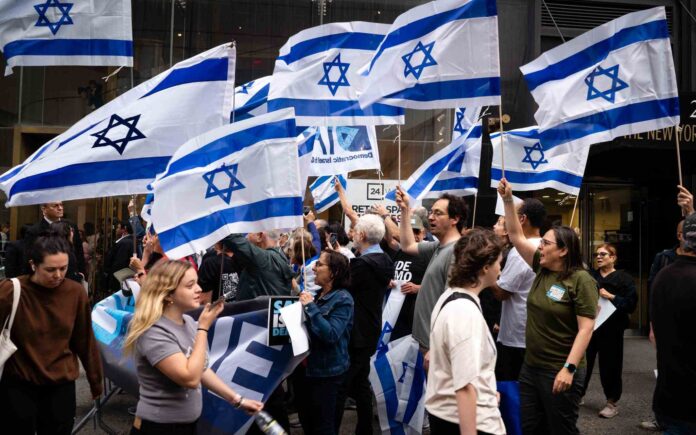Israel’s intense political disagreements are once again visible to all.
The determination to remove Israel’s longest-serving Prime Minister, Benjamin Netanyahu, has been greatly intensified by the war.
In Jerusalem, police used a stinky substance called skunk water, shot from water cannons, to disperse protesters who had blocked the city’s major highway, Begin Boulevard, which runs from north to south.
Familiar chants demanding Netanyahu’s resignation and early elections were joined by new ones urging for an immediate agreement to release roughly 130 Israeli hostages still held in Gaza. There’s worry among their families, friends, and the protesters that more hostages may perish if the war continues without a resolution.
On Sunday evening, amidst the crowd gathered near the Israeli parliament, Katia Amorza took a break from using her megaphone. She shared her frustration, revealing that she had been there since eight in the morning. With her son serving in the Israeli army in Gaza, she expressed her strong desire for Netanyahu to leave office. She even offered to buy him a first-class, one-way ticket out of the country. She also criticized the people in government, handpicked by Netanyahu himself, whom she considers the worst in society.
As Katia paused, a rabbi named Yehudah Glick walked by. Glick is known for advocating Jewish prayer in the area known to Israelis as the Temple Mount, which is also the location of Islam’s third holiest mosque, al Aqsa.
Rabbi Glick thinks that Netanyahu remains popular among many people, and that’s what frustrates the protesters. He believes they’re upset because despite their long-standing demonstrations against him, Netanyahu is still in power.
He urges the protesters to continue expressing their views loudly and clearly but warns them to be cautious not to tip over into chaos. He emphasizes the importance of maintaining the line between democracy and disorder.
The protesters, along with Netanyahu’s critics in countries that otherwise support Israel, argue that the real threats to democracy are already present within his government. They point to the coalition’s dependence on support from ultranationalist Jewish parties as evidence.
Among them is the Religious Zionism party, led by the finance minister Bezalel Smotrich. One of its MPs, Ohad Tal, said it was “naïve” to believe anything other than more military pressure on Hamas would free the hostages.
“You don’t think Hamas will bring back so easily the hostages in a deal, release everybody and then will allow us to, you know, to kill all the terrorists that we would release in such a deal…It’s not as simple.
“If there was a button that you can press and bring back all the hostages and make everything okay, every Israeli would press this button. But it’s not as easy .
Benjamin Netanyahu used to say he was the only one who could keep his country safe. Many Israelis believed him.He said that he could manage the Palestinians, settle Jews on the occupied land they want for a state, without offering the concessions and making the sacrifices necessary for a peace deal.
All that changed on 7 October last year when Hamas stormed through the border wire.Many Israelis hold him responsible for the security lapses that allowed Hamas to attack Israel with such devastating effect.
Unlike his security chiefs, who rapidly issued statements admitting they had made mistakes, Mr Netanyahu has never admitted any responsibility.
This deeply frustrates the thousands who took to the streets of Jerusalem on Sunday evening.
To remember a time before Benjamin Netanyahu dominated Israeli politics, you’d likely need to be around 40 years old. His first term as prime minister began in 1996, following a narrow victory where he campaigned against the Oslo peace process.
Similar to the current American efforts for peace in the Middle East, the Oslo agreements aimed to establish a Palestinian state alongside Israel, seen as the key to ending the long-standing conflict in the region. However, Netanyahu has consistently opposed the idea of a Palestinian state. He has openly criticized the US strategy supporting Palestinian independence, dismissing it as part of a broader plan to reshape the Middle East.
His critics here say his strident rejection of President Joe Biden’s plans for governance in Gaza after the war is a tool to secure the continued support of Israel’s extreme right wing.
One of the protesters outside the Knesset was David Agmon, a retired Brigadier General in the Israeli army. He ran the prime minister’s office when Mr Netanyahu was first elected.
“It’s the biggest crisis ever since 1948. I’ll tell you something else. I was the first chief of staff for Netanyahu in 1996, so I know him, and after three months I decided to leave. Because I realised who he is – a danger to Israel.
“He doesn’t know how to take decisions, he is afraid, the only thing he knows is to speak. And of course, I saw he depends on his wife, and I saw his lies. And after three months I told him, Bibi, you don’t need aides, you need a replacement. And I left.”While the protesters were still on the streets, Mr Netanyahu ruled out early elections and repeated his determination to mount a new offensive against Hamas forces in Rafah.
His record as a political survivor and formidable campaigner means that even if his opponents get their wish for early elections, his dwindling band of devoted followers believe he might even win.
Israelis are not divided about destroying Hamas. That war aim has overwhelming support.
But the way the war is being handled, and the failure to rescue or free all the hostages, is putting Benjamin Netanyahu under career-ending pressure. rewrite this easy to understand human tone
YOU MAY LIKE : WHAT JOBS CAN YOU GET WITH A COMPUTER SCIENCE DEGREE IN 2024
